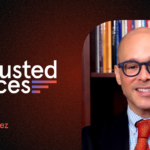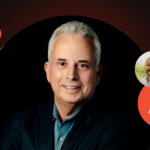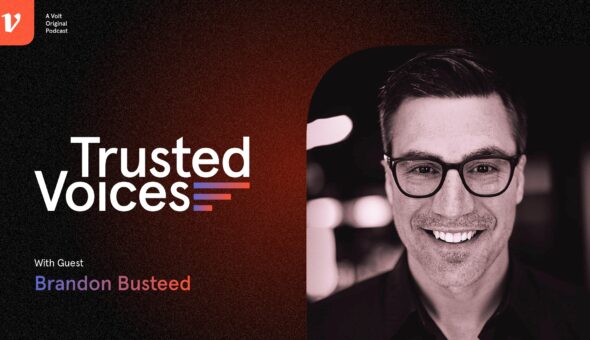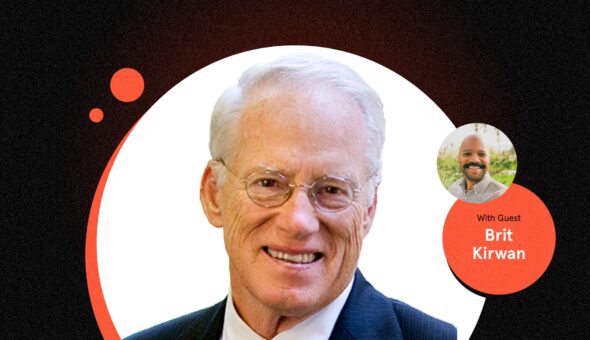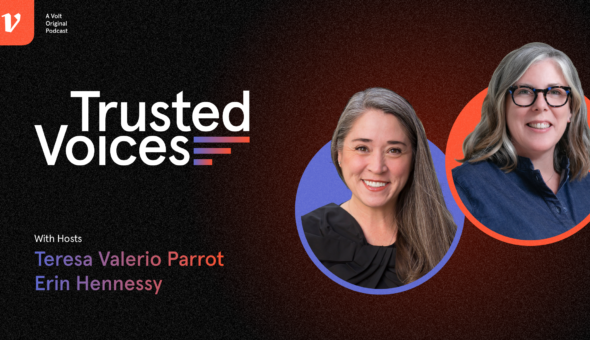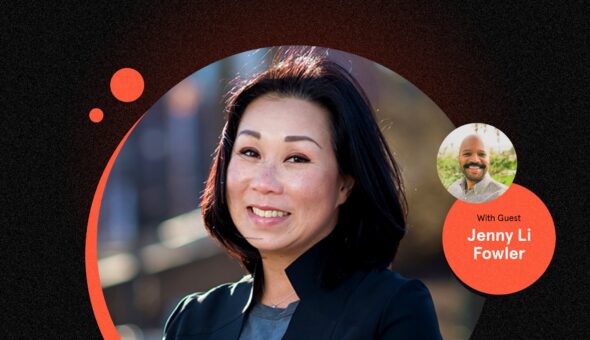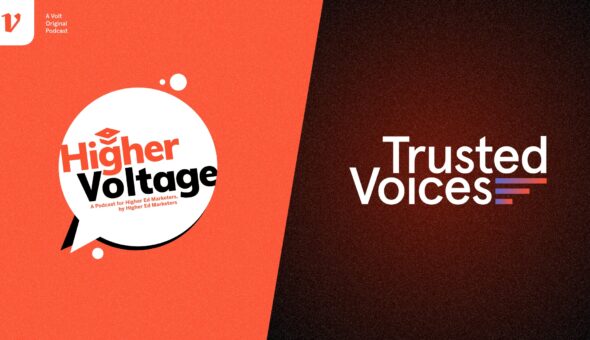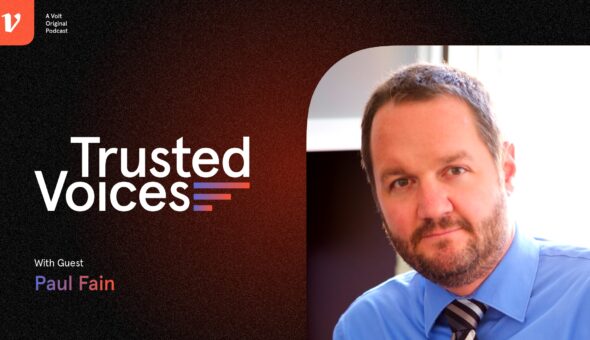Read the full transcript here
Kevin Tyler:
Okay. So on today’s episode of High Voltage, I am so pleased to have one of my good friends, fellow troublemaker, Eddie Francis. Eddie Francis is a brand strategy consultant, speaker and award-winning broadcaster who led marketing and communications at Southern University at New Orleans, Paul Quinn College and Dillard University. He was nominated twice for the AMA Foundation Higher Education Marketer of the Year and served as a member of the planning committee for the American Marketing Association’s Higher Ed Symposium. His podcast, I Wanna Work There, focuses on employer branding at colleges and universities.
Eddie, my dude, thank you for joining me on Higher Voltage today.
Eddie Francis:
What’s up, brother? How you doing, man?
Kevin Tyler:
I’m always better when you’re around, sir.
Eddie Francis:
Oh, check is in the mail, Kev. Check is in the mail.
Kevin Tyler:
I see this is gonna be a comedy show, so I’ll agree.
Well, first of all, I’m excited to see you. I always love talking to you. But what we are here to talk about, this idea of employer branding, is one of the things that has just kind of been kind of a glaring omission in the ways that higher education has marketed itself, at least since I’ve been in the business and that’s been. It feels like 1,000 years. But ever since I’ve started, I’ve never had a conversation about like how we start to talk about employer branding and higher ed.
So I’m really glad to have this conversation with you, especially as we know, more stories are going to be required for institutions to recruit the types of people that they’re after. And that includes the people who work there. And so before we get into like the nuts and bolts of what this could look like, I’m wondering if you might be able to set the table for our listeners about just like what you see employer branding as being in the space.
Eddie Francis:
So there are three things that I look at: talent attraction, talent experience and talent retention. Those are three major areas that higher ed needs to take much more seriously. And as a definition, I would say employer branding is any organization’s distinctive features that identify them as an employer of choice, not only to potential employees but also, as you mentioned, to current employees. Because we worry so much about getting the great talent onto the campus. And then it’s not a problem until it’s a problem. Then one day somebody goes, wait a minute, we’re losing people and we don’t know why we’re losing them. We don’t know why we’re losing them at this rate. So being able to retain that talent is a major part of employee branding as well. You know, one of the things that I really looked into at my last stop was, how do we market to ourselves? You know, and I think that employer branding is the next big thing in marketing when it comes to a marketing strategy in higher ed.
Simply put, you know, Kevin, to think of it this way, colleges want high student satisfaction, right? Well, who’s going to deliver it?You know, so that’s the question that we have to answer.
And at the end of the day, what colleges and universities really need to think about is it needs to think about attracting and retaining leaders who are going to educate, train and guide our next generation of leaders. And everybody who works on a campus or everybody who works remotely, they are a leader. Because I think with higher ed, that’s our charge. From the president to the facilities people to the deans to the directors on campuses, everybody has a pretty significant leader leadership role I think. And so I think that’s how employer branding, I think that’s how it looks in higher ed.
Kevin Tyler:
Mm-hmm. So, I mean, we’ve had conversations about, you know, the great resignation. People, it’s not an unfamiliar idea. We lived through several years of people talking about the great resignation and how hard it hit higher ed specifically. And a lot of the conversations around that had to do with, well, a pay, right? That was obviously an important point. But part of the other part of that conversation was about culture and that, you know, people are not going to, can’t pay bills with a mission, right?
So, there was a study that was done by EAB in August of last year that found that approximately 57% of higher education employees plan to job hunt this year. And so I’m wondering outside of the salary part, how can higher education create workplace cultures that not only attract talent but also retain it?
Eddie Francis:
Um, here’s a couple of the numbers that probably don’t inspire the most confidence, but you know, Cooper HR, they do their annual higher education employee retention survey. And so their last one was in September of 2023, and a couple of the numbers that stood out to me: 61% of the people who responded to that survey were looking to move away from higher ed to the private sector, 61%; 49%, they were looking to work at an organization outside of higher ed. And so I think the word here that you asked or you included in your question is the word that is incredibly important and that is culture.
And so I always say this, let’s look at a college campus as a small city, right? And some of them are actually the size of cities. And so when you look at that, you need your mayor, the president or the chancellor. And that person, whether they like it or not, or whether they realize it or not, they are going to set a tone for culture on that campus, right? And then you have your policy makers, you, you have all these people who, you know, the cabinet and, and honestly, to some degree, you know, your marketing people and your comms people are kind of included in that too, I would say. And then you have your operators around campus.
So, you have these three levels of people, the mayor, the policymakers, and of course, let’s include the policymaker, the faculty senate and all these other folks, and then your operators. Ultimately, what the small city needs is, it needs a bunch of citizens that are gonna come in and cultivate a productive culture. And they are not only gonna cultivate this productive culture for the sake of attracting and retaining students, but they’re going to do it for their colleagues as well. And so, what higher ed needs to figure out, any college or university, they need to figure out what the culture of that city is going to look like. The big issue that I look at a lot of times is that cynicism sets in when people feel like they have no work-life balance.
Of course we know pay is an issue around a lot of colleges and universities, but here’s the other thing, and this is a big thing, psychological safety working on a campus. That is a big issue. And, you know, you and I know that Kevin McClure is somebody who has been working on this. He was actually a guest on my podcast, uh, talking about caring universities. And one of the things that he mentioned, uh, when I talked to him was his attitude of scarcity that higher ed has. And so he told the story and it, well, he didn’t tell the story, but he made this commentary about what happens when people ask for advancement or when they ask for higher pay.
And this happened to me. I mean, my first job in higher ed, I’m getting paid, you know, this is public information. I was getting paid $45,000 to be a PR director and I was a one man show. And so, I’m doing about five to 10 people’s jobs and oh, by the way, I was doing sports information as well. And so I was doing all these different people’s jobs. And I went to my boss at the time and said, Hey, listen, you know, I’m having a hard time living on 45 grand. So what do I need to do to get a raise? And it was treated as a punchline. It was just like, well, why do you expect that? What are you, crazy? No, that’s not how this works. You don’t get increases in pay.
It was like, in Kevin’s words in the podcast that I interviewed him, you’re made to feel foolish for asking for things. And so higher ed has got to address that culture and higher ed has got to address this overall deficit mindset that it tends to work from, especially when it comes to working with employees.
Even if you have colleges and universities right now that are saying, oh, well yeah, the great resignation, we had a really big dip in our applications, but we’ve had an increase in the applications over the past year or so. Well, even if you’ve had an increase in applications, my question to you is as an institution, is it the quality that you need in these applications? Or do you just have a hundred people who applied and you’re just going to stick a mirror under the nose to see if they’re breathing?
What’ve we got here? What’ve we got? What are we working with, right? And so I think to really attract and retain this talent so that there is a great talent experience, people, number one, have to know that there is some return on investment to their dedication to that institution, right? I think that comes in a form of, and let’s throw money out of the window right now. I think that comes in a form of professional development, advancement opportunities, rewards, perks and then also clearly and consistently communicating to the employees the value of that experience being there.
I think another thing, and these might be two bad words that a lot of people don’t want to talk about, Kevin, but leadership development. Leadership development on campuses, and that includes the presidents. I’m not going to be shy about this. There are some people who have gotten titles, and they’re not leaders.
Okay, and so, you know, when you have someone who is abusive to people, they are really taking away people’s psychological safety. That is not a place anybody wants to work, right? You’re getting people who are gonna wanna work there for maybe one or two years, and they’re gonna wanna bounce through the next thing. So you’re renting people, and that’s costing the institution a little bit more money than they realize.
So, at the end of the day, I think to really put together a culture where people want to work at a college or university, we need leaders and not just the presidents, but the administrators, other administrators to realize, and I would also throw in the board, that higher ed is a people business. Higher ed is a people business. So the deans, the department chairs, the directors, the VPs, they have got to have strong people skills to attract and retain and to make sure that people have a great experience.
And here’s one more thing, Kev. Gen Z. They are now our employees, and they see this game a lot differently than even millennials do. Definitely differently than Gen Xers, definitely differently than Baby Boomers. They are into growth mindset. They are into vulnerability. They want leaders to be the people who they say they are. They want all of that. And so I think that if folks are going to have a culture on campus that is attractive, then a big part of establishing that employer brand is to make sure that faculty and staff have some return on investment and on the dedication that they are bringing to the table.
Kevin Tyler:
I think that makes a whole lot of sense. And I’ll be the first to say that I am not a member of the Gen Z by far. But those are the things I want to lead her to. Right. I mean, the currency that we have now and what leadership looks like is different than what it used to be. And, um, we are inviting people into a community, uh, that is, that, uh, exists to serve others,and if it feels toxic, then I don’t want to serve anybody. If it feels too oppressive, I don’t want to do what I’m supposed to be doing. And I’ll go find something that fits my philosophies around life and work a bit more if you can’t deliver it. And I think that, I get that.
Eddie Francis:
Yeah. And I mean, in leadership, Kevin, leadership models have changed so drastically over the past 20 years even. You know, I was at a conference once and it was, it was actually back in February, I was at this conference. It was a fraternity and sorority life conference. And there was a speaker who was asking, you know, what, what marks a different generation. There were maybe about five Gen Xers in the room. And so it was a room full of Gen Zers, but there were about five Gen Xers. I think, maybe, one Baby Boomer in the room. And when they got to Gen X, I raised my hand and I said, power. Gen X was all about power. It was about authority. We wanted the power. We wanted status. We wanted all of this stuff. And some of the other Gen Xers didn’t like my answer too much.
But think about who our role models were. Think about what was happening when we were growing up, right? You had Reaganomics, you had the Berlin Wall coming down, you had all this other stuff. And, you know, and a certain person who ran for president and became president, he was the hot talk when in the 80s, and people were like, oh yeah, I want to be like him. He looks like he has all the money. So a lot of us dragged that attitude into leadership.
A lot of us dragged that attitude in, where we said, well, I have the title, why are you asking me questions? Go sit down somewhere, right?
That has changed, and that is not gonna work anymore in higher ed because people are keenly aware, and a lot of us at Gen X have said, no, that may be what we grew up with, but it wasn’t cool. And honestly, it drove me crazy. And oh, by the way, as a Black man, I was a have-not. So, I want a different experience than the experience I saw a lot of times.
And I do think, that is why boards, I think presidents, I think administrators, they have to be very much aware of how they lead on these campuses, because that is going to determine how they are branded as an employer of choice, and it’s going to determine the quality of candidates, is going to determine, or has been determining how long, people stick around. And we saw what happened with the great resignation. It was not hard for people to opt out of higher education. So unfortunately, I think there’s more where that came from, but I do think that a big part of colleges and universities putting together an attractive employer brand is to really, really pay close attention to how campuses are led.
Kevin Tyler:
And let’s be clear, like even though there are thousands of higher ed institutions in the country, it’s a fairly insular industry in that just like the student experience spreads like wildfire throughout the industry, the employee experience does too. And you hear, oh, girls, you don’t want to work over here. That just amplifies the problems that you might have on your campus even not taking care of the people who are delivering your promise every single day.
Eddie Francis:
But you know what? People aren’t even paying attention to that. People aren’t even paying attention. So we have administrators who aren’t even paying attention to the Facebook chatter, right? So you have people on Facebook who write their little Facebook dissertations about why they will not work at a certain campus or a certain type of institution anymore. They are naming names. They are going to Glassdoor. They’re going to Indeed, they’re going in places that higher ed is not going to figure out what the employee experience is like and to figure out, okay, wait a minute, my competitor across town is not having a whole lot of luck with employees. So I’m looking at, so look at the reviews. If your competitors or employee reviews are not great, then go any other direction, man. Don’t, don’t sit there.
And, and you know what happens? Cause I’ve heard this before. What happens is actually one institution, there was this disgruntled employee who went out and put a bunch of stuff out there, it was dismissed oh their disgruntled, you know, blah, blah. They, they just don’t like it because they didn’t get promoted or, you know, or, you know, the, the term that people like to use it. Oh, they’re just crazy, right? And they’ll say that type of stuff. Well, that person may be “crazy” or that person may be disgruntled or whatever it is you want to call them, but they can still make noise. And it’s noise you’re not gonna like.
And in one situation, someone decided to sue the university where I was working. It went to court, it got into the media, and this person was dismissed as “crazy,” but they still made noise. And the public attitude became, and I was having to work the PR on this thing. And so the public attitude became, well, maybe they’re not telling the exact truth, but something is there. And that’s the part that’s damaging to the reputation of an institution as an employer of choice for someone to say, well, maybe what they’re saying isn’t completely true, but something is there. That something is their part, even that part is damaging to the reputation.
So that’s the kind of stuff that institutions really, really need to pay attention to. You know, they need to pay attention to what the reputational risks are, which I would say even if you have to let someone go, even if there’s an involuntary separation, you still want to monitor how that person is let go. And so, the way people leave is the way they’re going to communicate. And so, yeah, I really think that colleges and universities would do well to really figure out how to monitor those spaces that they don’t think matter that much.
Kevin Tyler:
Yeah, I think that’s an excellent point. While you were talking, what came to mind was the story of Dr. Bonnie Candia-Bailey at Lincoln University, who had a trail of complaints about her work experience there and ended up making her own life as a result of there not being any action. And I think we see these seemingly disconnected stories of employee experience that can either result in what you’ve just laid out or something far worse, like Dr. Bonnie’s case, whatever it is. But like that’s about the employee experience. And about some other things when there’s, you know, that level of reaction, but it’s not nothing. Right. I don’t know the details of that story, but something was going on.
Eddie Francis:
Exactly. Exactly
Kevin Tyler:
And those kinds of stories can prevent other really qualified candidates from being on a campus that they could provide great value to students.
Eddie Francis:
I think that is a really unfortunate example because, again, there’s something. I mean, that can’t be nothing. That can’t be all her. And the latest news is that president was reinstated and the board of curators, quote-unquote, found no wrongdoing. Well, even so, now there’s a Scarlet Letter on that place.
Kevin Tyler:
Exactly.
Eddie Francis:
I don’t know how many of the comments you saw, but I kept reading comment after comment from people saying, I’m triggered. You know, all the stuff that she wrote, her email, the stuff that was reported, that happened to me. And honestly, I personally was triggered, Kevin. I mean, I read the email content that was reported and I said, I almost said this exact stuff to people at times, you know, that it was. Yeah, well, I’m trying to do this, I’m trying to make sure that this is a great work experience for me and for you, but here’s, you keep throwing it in my face. There was one thing she wrote in her, in one of her emails, and there was something that she was reported to have said to a friend where she said, “I’m just trying to make it through.”
How many people have said that? How many times have people said that in a toxic work environment? I’m just trying to make it through. So unfortunately for the institution, and unfortunately for the students at the end of the day, there’s now a Scarlet Letter on that place. And so I can only hope that at some point, something is gonna work out in favor of the institution itself, but they have some really serious decisions to make, especially, especially where it concerns employee satisfaction, especially where it concerns potential candidates for jobs over there, and especially where it concerns how people leave.
Electric Kite ad read
Kevin Tyler:
I worked at lots of agencies in the higher ed marketing space. And it feels like I’ve worked on thousands and thousands of student recruitment campaigns. So often we hear about what an institution promises its students, but very little about what that same institution promises to its faculty and staff and administration.
Why does it seem like that group, faculty, staff, administration, etc. are so glaringly missing from the, not just the attraction conversation, but also the retention conversation?
Eddie Francis:
First of all, a lot of schools aren’t even thinking about retention. That’s, that’s one reason they aren’t even thinking about because so many colleges and universities have a next-man-up attitude. So what it is, is, oh, so and so left. Fine. Go ahead and hire the next person.
I remember, you know, and a good friend of mine made this comment once that he was trying to hire some folks. And he got really frustrated, and understandably so, because he was looking at an applicant pool that just wasn’t working in his favor. And what he said is not unique. I mean, I’ve heard this as a recruiter. I heard this, I don’t know how many times out of frustrated hiring managers, but at some point he says something that every frustrated hiring manager says. He gets, he goes, “I just need a warm body in here.” And I’m sitting there going, no, you don’t need a warm body because that’s part of the problem.
So in higher education, the difference is, colleges and universities are mission-driven. So you need people in there who may not believe in the mission of the institution, but they do believe in the mission of higher education. You need people who are there because they want to be there. And again, it’s a people business. And one of the differences here, if you just think in terms of customer dynamics, the big difference in higher education is that your customers are always around you. So they live on campus, they are taking courses, they are constantly there, even in a remote environment. The customer is always there, they are not going anywhere.
And so when you take a look at institutions really struggling with retention, I think part of it, and this is another thing that’s part of Kevin McClure’s commentary, there’s so much attention paid to satisfying the student that folks forget that there’s somebody serving the student. I don’t think there’s any area where that is more evident than in student affairs, right? I mean, student affairs, you know, God bless them, because there are people in the student affairs working for peanuts. Yet they have to be on hand and they have to go to these students and they have to serve the student 24-7. They have to be on call. They have to be on campus from 6 a.m. to 10 p.m. I mean, on a daily basis. Goodness gracious, student affairs and new student orientation and getting ready for the holidays, moving them out, then moving them back in and doing all of this stuff. And these people can, a lot of them can barely put food on a table, some of them.
I actually, you know, I actually met someone who worked in student affairs somewhere, he had just, this guy had just gotten an Ivy League degree. And he was passionate about student affairs. And he was really happy to be at the college where he was working. And after I talked to him, somebody says, yeah, you know, he’s really going through it. And I said, really? He looked happy to me and they go, and they went, well, you know, he has to put a face on because he’s student affairs. And that’s kind of how, that’s how he’s trained, to have a face on all the time. I found out that the guy didn’t have any furniture in his apartment. He barely had any food on the table or in his refrigerator. I mean, he was constantly sick, and there were just all of these issues swirling around. And he was just so committed to the mission, so committed. And yet I’m sitting there going, well, can they at least boost his pay a little bit so he can get him some food or something? Because I was like, this doesn’t compute. This does not compute for him to be so dedicated. And it feels like he’s being punished for his dedication, right?
And so I think the most, the most damning thing about this is that when you talk about talent attraction and talent retention, you’re talking about business, right? You’re talking about business initiatives there. The most important resource, we say this all the time, is the human resource in every single industry. People say the most important resource is the human resource, which I’m starting to laugh now when people say that. And if the most important resource that is making your business run is the human resource, then the problem that higher ed seems to have is that higher ed doesn’t understand the cost of doing business in the first place. That is what troubles me.
Because to me, what you have is the tail wagging the dog. You have all of these people, all the colleges and universities that are doing any and everything possible to get as many students on campus as possible, but they are not well-staffed. So something’s got to give. You got to figure out which one you want first. You either want the people to do it and you’re gonna pay them well or you’re gonna make sure they are not overwhelmed constantly, right? I work at three HBCUs, the home of places where everybody does at least five to ten jobs.
And you’re sitting there like, yo man, I mean, I’m tired. You know, I’m just tired. Every time you talk to people, it’s like, Hey man, how’s it going? You know, you’re at homecoming, having a good time. It’s like, how are you doing? I’m tired. And so.
But something’s got to give, you know, higher ed has got to understand the cost of doing business. And I think higher ed has got to really think about how to invest more into the most important resource, the human resource.
Kevin Tyler:
So, are there colleges that you can point to, or universities that you can point to, who are doing this well, or at least trying to in a respectable way?
Eddie Francis:
You know, I have seen an uptake in institutions that are trying to put, um, sound employer branding in place. I will give a shout-out to your alma mater, to Pitt. Because I actually took a look at their talent attraction website. And I was like, man, this is really cool. They have great images. They present well in terms of mission and vision and values. And so, I would be eager to see how Pitt is carrying that throughout campus behind the great website.
Kevin Tyler:
That’s a conversation for another day.
Eddie Francis:
Yeah. And it, you know, and it always is. One thing I will say about this before I go on, one thing I will say about the employer branding converse or conversation is people should not expect paradise. Don’t expect it to be perfect and don’t expect it to be like the happiest place on earth because that’s not realistic. I don’t think 100% employee happiness is what you’re looking at. You do want to get a high rate of employee satisfaction.
And there’s a difference between the two. If people get upset, but they say well, you know what? I’m really upset by this decision that the president made but this is still a great place to work. I mean, that’s really the most you can hope for. Or if people say, I learned a lot here. I was able to advance here. I was able to make a good wage here, or this prepared me for my next step. If that is what you get, then I think that’s a winner. I think that’s a winner. So yeah, let’s not look for paradise.
But I will say also, I do know that a couple of institutions have beefed up as far as including HR communication specialists, Saginaw Valley State is one, Iowa, UMass Amherst are institutions that I know of. And I know that there are way more, but those are the ones that come to mind. But Kevin, I would also say that any institution that really knows how to talk about the value of the work experience on campus or remotely, any institution where the work of the faculty and staff are highlighted with a sense of intention, not just to throw a press release out there, but with some real intention to really reflect the values and the mission and the brand of the institution. And then I would say any institution is doing a good job if not only they collect employee data but they do something with the employee data. So, I think that’s really important because if you really, really want to hack off faculty and staff, go ahead and give them a survey and don’t do anything with their feedback. That is a really good way to not get buy-in obviously, but you’re definitely going to get some buy-out because people get really upset. These are educators, right? These are people in the education sector. So when you collect data, they want to know what’s happening with the data.
Kevin Tyler:
Right.
Eddie Francis:
And they want to see the results of it. So any institution that collects employee data and they actually do something with it, and they communicate to the faculty and staff, hey, you said this, we’re doing that. You said you don’t like this. We are going to work on correcting it this way. You said you love this, we’re going to do more of that. And so, I think, you know, if not for solid examples, there are definitely those institutions that really do care, they show they care about their employees. And I would say those institutions are definitely probably doing pretty well as far as having compelling, attractive employer brands.
Trusted Voices ad read
Kevin Tyler:
So I appreciate the examples you just provided. Those feel like inside out. Like if I’m already on a campus working, these are the things I can look to to see, kind of get a temperature about how the employer branding conversation is going on my campus. What kinds of things would you recommend people to look for who are looking to join a campus? Like what are the signs, the red flags and the green flags that people might look to understand what the employer experience or the employee experience might look like?
Eddie Francis:
Yeah, I can tell you one thing that people are already doing. Again, this is something that administrations are not paying attention to. But job seekers always go to places like Glassdoor, Indeed, Salary.com. Oh, Salary.com. Boy, people love going to Salary.com. And you can, and you can tell when somebody goes to that website because you’re sitting there going, okay, this is the pay. And they’re like, well, I was thinking more like, it’s like, oh, okay. They know, they know how much they’re worth. You know, good job. And so, and let me tell you.
I actually had on my team, the last stop I was at, I had somebody on my team who negotiated really high and I loved her for it. I mean, I didn’t have the money to pay her as much as she wanted, but I said, okay, she really values herself, which means she’s a good one, and I really need her on the team.
So, but I would say one thing that people should look for in terms of, let’s start with red flags. I mean, red flags, either chatter or no chatter at all from the faculty and staff. Cause I think no chatter at all is just as much a red flag as chatter. The other thing is read up on the leaders, read up on the president, take a look at who’s on the board. Hey, take a look at all of those people. Of course you can always, if they can visit the campus. If you were in a position to visit the brick and mortar space, I would definitely say, go take a look at it. Take a look at the mission, whether or not your personal mission aligns with the mission of the institution.
The other thing, I am really big on core values. I’m really big on core values. I think an institution really should publicize their core values because your institutional core values determine how you behave on campus. It determines the kinds of decisions that you make. It determines how you conduct business. It can, it determines how you treat people, how you treat the students, how you treat the employee, it determines all of that. And so if I were looking for a job, I would take a look at what the institutional core values are. If the institution doesn’t have core values, I would consider that something rather curious myself, right?
And I think as far as green flags, you know, I would say take a look at the students because you do have those folks who can compartmentalize the employee experience and they are saying, hey, listen, you know, I don’t need all the things if I can be around some good students and they keep me energized and alive, then I’m fine with that. And so, I would say, you know, if you see a student culture that seems healthy, then that’s something to look out for.
I think if you do have an institution that is not shy about saying, if you somehow get wind of something, because, you know, faculty and staff talk. And so, if you get wind of something where the institution admits that they made an error, and they know what they … and they are doing something to correct it, I would consider that a green flag because that is an indication that they are communicating in with the spirit of transparency. And I would consider that a good thing. Yeah, I definitely believe that.
And then honestly, you know, Kevin, I mean, let’s not let’s not take away from the fact that if a campus does have a vibrant athletic life, if it does have a vibrant student life, if it’s in the city that you want it to be in, and again, you can compartmentalize a lot of other things, then those are also green flags as well for the institution to fit the kind of person that you are.
And it doesn’t hurt, it really doesn’t hurt for the institution to have some perks. It doesn’t hurt at all because, you know, especially if they publicize them. I remember once I was asking at one of the institutions where I worked, I found out that there was this really cool tuition benefit that I could have used for my kid. And I said, well, wait, where’s this information? They said, oh, we’ll email it to you. And I said, well, no, why is it not on the website of some place where I have access to this kind of information? So I would say, you know, a green flag is being aware of what the perks are of working there, what are the benefits? All that, all that cool stuff. That’s the green flag material because, um, the institution, they’re at least proud that they offer this to the employees. And, and that’s something that I would consider a big plus too.
Kevin Tyler:
Before we go, I want to ask you the question that I ask every guest who joins me on Higher Voltage. I think, though, I’d like to change it just a touch through the lens of employer branding and employee experience. What do you think, through that lens, higher ed will look like in five or 10 years?
Eddie Francis:
I’m concerned, honestly. I’m very concerned. And one of the reasons I’m so concerned is the short tenure of presidents. Unfortunately, when you have presidents with short tenures, what you’re talking about is brand instability. And so, what tends to happen is that you have this new president who comes in just because of Tuesday, they decide they want to change the tagline or they decide that they want to do a whole new thing. And what that does though, is that creates a lot of tension with the faculty and staff, because people may think, well, it’s just a tagline. It doesn’t mean anything.
But making those kinds of changes are indications to me of bigger problems. Because you pull the thread and you’re gonna find out whether there’s something else they wanna change, there’s something else they wanna change, there’s something else they wanna change. And let’s not even forget about people who come in and they probably know they’re gonna have a short tenure. They’re probably choosing to have a short tenure. And so what they come in and do is they make it their little stepping stones to the next thing. And the faculty and staff aren’t stupid. They’re gonna see that. They can hear it in everything the president says and does, unfortunately.
And so, with these shortened presidential tenures, you’re also looking at poor leadership development on campus because there’s so much attention a lot of times to processes, to fundraising, to research, enrollment, all that good stuff, but not the people who make it happen. So it turns into what do I need to do right now?
So unfortunately, you know, I wish I had a great answer to this when they said, oh, hi, red is going to be great. And I don’t know. I’m concerned, man.
But here, but here’s what I think happens. I think institutions that do work on their employer brands, and they work on it very seriously, and they work on it with a sense of intention, and they don’t work on it just to attract employees. They work on it because they want to provide a great experience, and they want to retain these great employees. I think if they can put a strong brand in place, and the only way you’re going to put a strong brand in place is if you have a strong culture. And so if they can put that strong brand in place, which is going to come from a strong culture, then I think what these institutions have an opportunity to do, is they have an opportunity to have people who will come in and they’re going to answer to the culture, as opposed to the president coming in and wanting to change a whole bunch of stuff around because of their narcissistic pursuits, right? So I think that’s how a lot of institutions can safeguard. That strong brand, I think, is gonna put the institution first and the leader really answering to the culture and the brand of the institution.
Kevin Tyler:
I think that makes a lot of sense. I think one of the things I often think about and also say out loud is that, the brand is not just to attract the students. A strong brand also attracts leadership, it attracts, it attracts faculty, all of these things. And so we’re not paying attention to the brand. Then we’re not going to only not get the students. We also won’t get the people who are delivering the brand, right?
I think the other things that I think about that are kind of more tactical, I guess, are around the experience of like “intake,” right? When I’m applying to a school and they’re talking about how innovative we are and how diverse they are, I’m gonna expect that the application process, for instance, does not have me filling out my resume and then uploading my resume. Or we’re talking about, or like entering my jobs in the past and then uploading the document as well, that doesn’t feel innovative.
If we are talking about an institution, where they’re talking about how fluent in diversity they are, that I’m gonna expect certain things. I’m gonna be expected, I’m gonna expect to be asked what my preferred pronouns are, how I prefer to be addressed. There are these little indications that we can give people when we’re trying to invite them into our community. That if we say this thing, then we’ve already set an expectation. And if we don’t deliver against that expectation, then we are not who we say we are.
And so all these things like they get pieced together and people make assumptions and their perceptions get built from the things that we are putting out into the world. So to me, in five or 10 years, I hope that processes are smoothed out, that the language we use for attraction are actually replicated or reflected in the action of the experience. I think that those are really, really important things because people are paying attention to all of that stuff. You can’t just throw words like innovative out into the world and not expect that you ask questions about that.
Eddie Francis:
Yeah, yeah. I’m glad you brought all of that up because I agree with that 100%. Because I’m thinking about institutions where in a job description, it says things like, even though you may not feel as if you’re qualified for this job, still apply because, and they give you, and they give you this, this language that’s really empowering. And it says, you know what? I really do believe that this is something I want to apply for. The long form job description, that’s a PDF and you know, must lift 30 pounds and you know, all this stuff that’s on it, you know, our good friend Jamie Hunt talks about that, you know, the must lift 30 pounds. I think, and it doesn’t even, it doesn’t even pay attention to any sort of diversity of ability or anything like that. You know, you’re right. I mean, those are also a bunch of things that colleges and universities need to pay attention to.
But again, you know, and I’m a 30,000-foot person. Again, I think from a 30,000-foot level, you get to that point, if at the 30,000-foot level, you’re looking at all the things, all the things that the data tell you have to change or all the things you have to keep doing, you do get to that point where you have job descriptions that are sensible.
And I’m gonna throw a really interesting one in here. If even you change the job descriptions so that even if it’s someone who in a professional position doesn’t have a bachelor’s degree, if they’re still a hell of a fundraiser, you consider that person, right? And you make it part of their package that they can get a degree at that institution, free. You know?
So I mean, so those, you’re right. There are so many little building blocks that do lead to creating a great employer brand. And I do think that, again, from this 30,000-foot level, having the attitude of what do we need to do to make sure that we have a great student experience? Who are the leaders who are gonna come in and help us educate, train and guide the next leaders? Who are they? What do they look like? And what risk can we take to make sure we have the right people giving us what we need to get the highest student satisfaction?
Kevin Tyler:
Eddie Francis, I love hanging out with you. Great conversation. We will have links to some articles about employer branding that people might find helpful. Again, always a pleasure. Eddie, thank you for this time.
Eddie Francis:
Thanks a lot, man. Appreciate it. I always appreciate hanging out with you, Kev.
Kevin Tyler:
You too.


